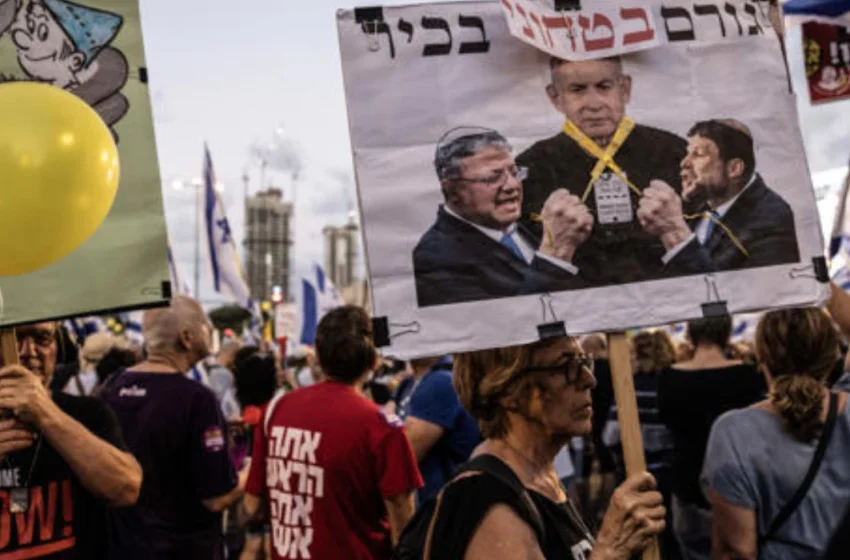
Israel ( Europe Brief News): Western allies of Israel have imposed sanctions on two far-right ministers, accusing them of inciting violence against Palestinians in the occupied West Bank.
In a statement, the nations of Britain, Canada, Australia, New Zealand, and Norway announced that they were taking action against ultranationalist settlement leaders and members of Israel’s coalition government, Finance Minister Bezalel Smotrich and National Security Minister Itamar Ben Gvir.
Over the past few years, and as tensions have spiked, the two men “have incited extremist violence and serious abuses of Palestinian human rights,” the statement said.
“Extremist rhetoric advocating the forced displacement of Palestinians and the creation of new Israeli settlements is appalling and dangerous,”
it added.
“We have engaged the Israeli government on this issue extensively, yet violent perpetrators continue to act with encouragement and impunity.”
Israeli officials criticized the move, with Foreign Minister Gideon Saar describing the sanctions as “outrageous,” “scandalous” and “unacceptable.”
“This is a planned and coordinated pressure campaign,”
he said in a statement.
“We will hold a cabinet meeting to decide on our response.”
Smotrich wrote on X that he learned of the news while attending the opening of a new Jewish settlement close to the city of Hebron in the West Bank.
“I heard that Britain had decided to impose sanctions on me because I am thwarting the establishment of a Palestinian state,”
Smotrich wrote.
“There couldn’t be a better moment for this. … With God’s help, we are determined to continue building.”
Smotrich wrote on X that he learned of the news while attending the opening of a new Jewish settlement close to the city of Hebron in the West Bank.
The West Bank, which Palestinians had believed would comprise the majority of any future independent state, has experienced an aggressive increase of Israeli settlements under Smotrich’s leadership. Injuring roughly 44 Palestinians every month, the pace of settler violence is at its worst level in 20 years, the UN warned last week.
How the sanctions in each nation would affect the ministers and their government operations was not immediately apparent. According to a separate statement from the Foreign Office, the measures in Britain include a travel ban and a freeze on financial assets.
But, the statement said, the two men were being penalized in their “personal capacity” rather than as ministers.
“Israel must cease expansion of illegal settlements which undermine a future Palestinian state, clamp down on settler violence, and condemn inflammatory and extremist statements from both individuals,”
the statement said.
A major break from Israel’s most important ally, the United States, was signaled by the united action of several of its most important friends.
Four of the five countries of the Five Eyes intelligence-sharing cooperation, including Washington, are among those imposing penalties on the ministers. Regarding the violence in the West Bank and Israel’s actions in Gaza, where it is engaged in a punitive war against the militant organization Hamas, neither the Biden nor Trump administrations penalized top Israeli leaders.
Since Israeli Prime Minister Benjamin Netanyahu placed a complete closure on the enclave in March, British dissatisfaction with Israel’s tactics in Gaza has grown.
However, Netanyahu declared in May that he would start allowing a small amount of U.N. aid into Gaza as hunger experts warned of a possible famine.
Simultaneously, Israel unveiled a new assistance distribution system that involves American contractors, but it has been plagued by violence and turmoil since it debuted two weeks ago.
Britain backed France and Canada in demanding that Israel cease its military expansion in Gaza and permit humanitarian aid to flow, threatening “further concrete actions” if it didn’t, amid predictions of mass hunger last month.
In a speech to the House of Commons, British Foreign Secretary David Lammy denounced Israel’s recent actions as “repellent,” “monstrous,” and “morally unjustifiable.”
Following Britain’s suspension of free trade talks with Israel, the European Union announced that it will examine its business relationship with Israel, citing an association agreement that included human rights clauses.
According to a diplomatic source with knowledge of the British government’s thinking, Tuesday’s penalties were intended to be a measured follow-through on the pledge to take further action. Speaking on condition of anonymity to disclose sensitive considerations, the official stated that Ben Gvir and Smotrich, who are seen as extremist even by many in Israel, were deemed logical targets for penalties.
But while the sanctions focused on the ministers’ actions in the West Bank, the statement from the five countries’ foreign ministers said they “cannot be seen in isolation from the catastrophe in Gaza.”
“We continue to be appalled by the immense suffering of civilians, including the denial of essential aid,”
the statement said.
“There must be no unlawful transfer of Palestinians from Gaza or within the West Bank, nor any reduction in the territory of the Gaza Strip.”
How might these sanctions influence Israel’s future policies on West Bank violence?
Extremist speech and acts that incite violence against Palestinians will have real repercussions, as the penalties represent a rare and forceful diplomatic rebuke from historically pro-Israel nations.
In order to prevent additional international isolation and sanctions, this could put pressure on the Israeli government to reevaluate or alter policies that support settler violence and settlement growth.
The penalties serve as a warning to Prime Minister Netanyahu and his coalition that further backing of extreme elements may have political and personal consequences, in addition to the sanctioned ministers.
Human rights activists believe that this could have an impact on internal political considerations by shattering the “wall of immunity” that Israeli leaders have long enjoyed.


